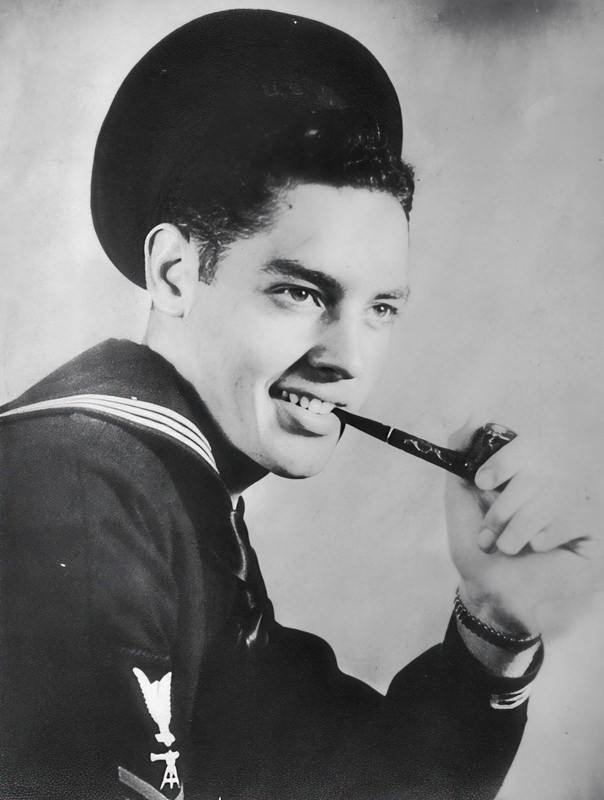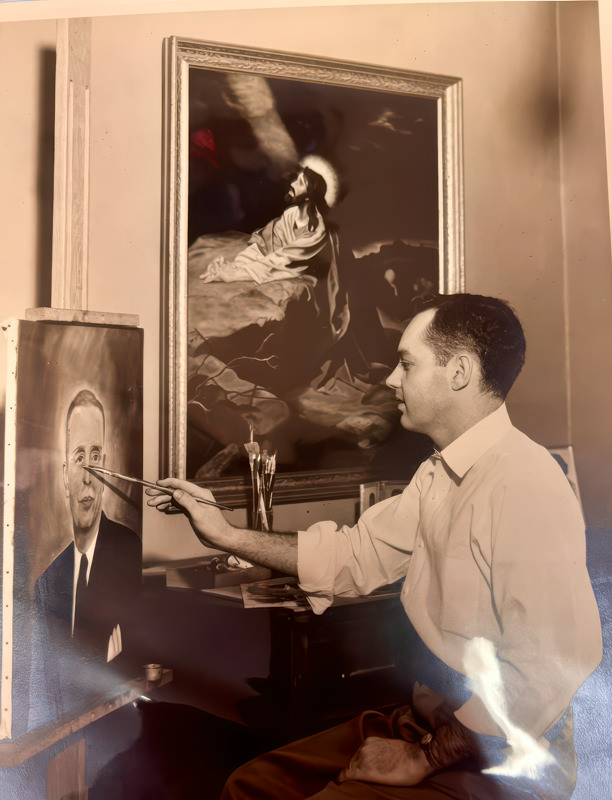World War II veteran Bob Luttrell reflects on nearly drowning in the Pacific and the work of art his life became
Bob Luttrell didn’t want to let his mom down. Only minutes after breakfast aboard his patrol gunboat in the Pacific Theater of World War II, an explosion rocked the vessel, and it started to list. The 19-year-old US Navy seaman’s first thought was, “My mother used to say, ‘Don’t go in the water until an hour after you eat.’ I said, ‘Mom, this time I can’t wait an hour!’” His second thought was the shortest, most desperate prayer he would ever utter: “‘Lord, help me!’ That’s the quickest I ever got an answer to a prayer,” he recalls. “The next thing I heard was JUMP!” Within three minutes, the ship was sunk.
“I dream of painting and then I paint my dream.” ~ Van Gogh
On a steamy summer afternoon, Bob Luttrell stands on the porch of his modest one-story home at the end of a cul-de-sac in northeast Knoxville, offering a smile and a friendly wave. Signs of improvements he has made to the house since paying $8,500 for it in 1954 include the carport to the right of the front door, under which rests a sedan that Luttrell only stopped driving a year ago.
After a few pleasantries, as it becomes uncomfortably obvious that the blistering temperature and humidity are only a few degrees lower than Luttrell’s age—he turned 100 on July 5—he deftly maneuvers his walker inside and sits down in a favorite chair in the corner of his living room.
The first impression of the room, and later of the entire house, is how crowded its walls are with art, mostly oil paintings created by Luttrell himself—primarily scenes depicting elements of his devout Christian faith, but also of war battles and heroes along with framed photos of family members. There are also stacks of printed art, articles, cards, books, and mementos around the room.
As Luttrell begins pointing to items on the walls and on the table beside his chair and explaining their significance, it’s quickly apparent how sharp his mind is, how vivid the recollections remain, how fluidly the stories and names and seasons of his life begin to flow like a stream over eon-smoothed Smoky Mountain stones.
He flips through a book of his paintings that are on display at The Crown College over in Powell and pauses on one that clearly moves him: a depiction of Abraham preparing to sacrifice his son Isaac, right before the Lord stayed his hand. “I could never imagine what it would take to do that,” Luttrell says, shaking his head.
He then tells of his upbringing, his earliest memories, and his school years at Central High—it takes a moment to process the fact that this man was a teenager in the 1930s.
He speaks of enlisting in the Navy at 17, of protecting minesweepers and cheating death in the Pacific Ocean, of earning an electrical engineering degree from the University of Tennessee, of his 41-year career in ad sales at the Knoxville Journal and News-Sentinel, of the joy of portraying Ronald McDonald for local franchises—and the fistfight between two moms over a place in line for their children to meet him—of his longtime love of painting and baking cakes, and especially of the family he adores, including his three sons, five grandchildren, and three great-grandchildren.

“Blackberry pickin’, eatin’ fried chicken, and I never knew a thing about pain. Life was just a tire swing.” ~ Jimmy Buffett
A love of blackberries and a family tradition of picking them on Independence Day meant that the baby due to Kittie Luttrell almost arrived in a patch. His mother did leave the field in time to make it to old Knoxville General Hospital, where Robert Lewis Luttrell entered the world on July 5, 1925, sharing a middle name with his father, Walter.
From his earliest days, Luttrell was precocious and curious. “My life has been filled with excitement. I’ve been on the ‘front line’ ever since I was born, I believe,” he says with a chuckle. It wasn’t long before he was building and flying model airplanes. (That hobby later took flight when he became an actual pilot.)
After an idyllic East Tennessee upbringing, Luttrell enlisted in the Navy at 17 and, after some training statewide, was transferred to the Pacific as the war raged there.
Enter what is perhaps his most vivid memory, and certainly the most harrowing: the morning of Sunday, April 8, 1945, when his 173-foot gunboat, PGM 18, was blasted by the Japanese, and he and many of his crewmates leapt overboard, scrambled into life rafts, and clung, quite literally, to hope that they might avoid a watery grave.
PGMs (patrol gunboats with a motor) served a dual role in the war: they protected minesweeper ships and, after an underwater mine had been located, cut loose, and floated to the surface, the PGM would blow it up.
The attack on April 8 opened a hole in the craft’s starboard side, which quickly began filling with water. Of 65 men on board, 14 were lost that day. Luttrell was able to throw a raft into the water before leaping overboard. Even in the raft, danger remained: a rope line was tethered to the doomed vessel as it sank. Luttrell pulled out a knife he had made from scrap metal, and an officer used it to cut the rope just in time.
Luttrell looked around. “There was fire everywhere, and that water was full of sharks,” he says. The raft held 10 men. When they started to pull an 11th into the raft, they discovered only his torso remained. They removed his dog tags before dropping him back into the water.
Six long hours later, a small sub chaser attempted to pick the men up, but it was blown up mid-rescue. Finally, a whale boat picked them up, and the group made their way out, eventually riding on an almost-sunk war boat back to San Francisco Bay.
Luttrell was later assigned to another vessel to continue protecting minesweepers, but the war ended while he was en route. By the skin of his teeth, he was headed home.

“Advertising is based on one thing: happiness.” ~ Don Draper, Mad Men
After returning to Knoxville, Luttrell was offered a job making $35 a week, but that didn’t strike his fancy, so he enrolled at UT on the GI Bill and completed his electrical engineering degree. Yet his career destiny would not involve wires and circuits. Instead, his personality would be given a chance to shine as he worked more directly with customers.
“My dad had a friend at the Knoxville Journal, and he wanted to hire me,” Luttrell recalls. “He said, ‘I’m gonna make an advertising man out of you.’ And he did.”
Boy, did he. Luttrell thrived at the Journal (1948-50) and then the News-Sentinel (1950-90), developing strong relationships with his ad clients—so much so that when Luttrell developed a flair for oil on canvas, he painted a number of portraits of the leaders of the newspaper’s advertisers. He later served as president of the News-Sentinel’s retirees for 21 years.
Another way Luttrell thrived was when a businessman friend invited him to don a yellow-and-red costume, apply make-up, and serve locally as Ronald McDonald, the now-iconic clown introduced in 1963 and first portrayed by Willard Scott.
(In a touch of irony, Scott, the longtime NBC weatherman, later visited the News-Sentinel while in town. He shared his red-velvet-cake recipe with Luttrell, who went home, tried it, tweaked it to his liking, and was off and running as a baker.)
The friend first opened a McDonald’s franchise on Broadway, then on Magnolia and Chapman Highway. Over 18 years and the opening of 23 McDonald’s, Luttrell delighted little ones dressed as Ronald. “The feeling I got by doing that, to be with the kids and see how they reacted—it was just wonderful.”
“Live not one’s life as though one had a thousand years, but live each day as the last.” ~ Marcus Aurelius
Even with all of that, the highlight that Luttrell beams the most about is the youth class he taught at Central Baptist in Fountain City focused on memorization skills. “A buddy of mine was a bomber veteran, and we taught it together. That’s the best 22 years I ever had,” he says. “I still see those kids today. They’re in their seventies.”
Exactly a century after Luttrell’s birth, family and friends threw a birthday bash for their favorite centenarian. The smile on his face as those in attendance honored him was as wide as the Pacific itself. Reflecting on the party, Luttrell shakes his head. “I sure didn’t think that many people would be there.”
As for the secret to his longevity, Luttrell laughs and then harkens to the fifth of the Ten Commandments in the Old Testament: “‘Honor your mother and your father.’ I loved my parents and I believe they were about the best that anybody could have.”
He also repeats a credo that continues to guide him as he looks ahead to dreams yet unfulfilled and projects yet unfinished—no, he’s not done; he’d like to write a book, and he talks excitedly about a plan for a restaurant he developed—“Stay busy, stay busy, stay busy.”
Luttrell is doing just that. Yet the rich legacy of influence the centenarian embodies is already long solidified.
The difference he has made as a war veteran, a professional, an artist, a community servant, a church teacher, a beloved family member, and much more will remain, painted on the canvasses hanging on the walls of his home and, even more poignantly, etched into the hearts of the countless fortunate souls whose lives he has brightened.

Comments are closed.